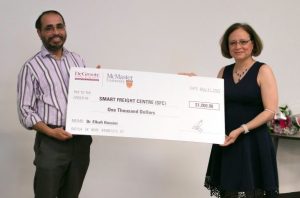SFC McMaster Recognized by the DeGroote School of Business Award for Community-Engaged Scholarship

Truck safety on roads. Neighbourhood’s healthy living when it comes to reducing carbon emissions. Helping to lessen traffic congestion by analysing e-commerce freight flow data. These are some of the positive community contributions in which Elkafi Hassini, professor of Operations Management at DeGroote, has been involved in as Chair of the Smart Freight Centre (SFC). Hassini’s efforts with the centre of excellence for goods movement have been recently recognized by the DeGroote School of Business Award for Community-Engaged Scholarship.
“I see this as a recognition of everyone at SFC,” says Hassini of the award, which was developed to celebrate local (southwestern Ontario) community-based research partnerships that produce and mobilize knowledge in mutually beneficial ways.
“We work as a team, and I don’t think any one of us would have achieved what we have at SFC by ourselves. This was what motivated me to get involved. SFC is a collective that goes beyond any one university, and it breaks some of the barriers universities face on their own.”
SFC is a collaborative network established by the Region of Peel, McMaster University, University of Toronto, and York University. Toronto Metropolitan University is the last university to join SFC. It provides innovative evidence-based research and decision support on regionally significant goods movement issues and projects in Peel Region and in the GTHA. SFC also advocates for the coordination of transportation infrastructure, land development, regulations, and technology tools and resources.
Grounded In Community
“Peel Region, which initially reached out to universities, wanted to invest in SFC to support its transportation industry and the economic well-being of its residents,” says Hassini. “Then, Sabbir Saiyed (Peel’s Manager of Transportation System Planning, and SFC’s industry liaison), encouraged Peel to look at it from an interdisciplinary approach.”
“The problems aren’t one dimensional, so it helps to have different perspectives from people who work in relevant areas. We regularly communicate with Peel to jointly identify what kind of problems they have and then there is a back and forth to define the research projects. We’ve presented our findings to their council and there is always the possibility to impact policy right in the chamber when they are making decisions. SFC is grounded in community.”
In its fourth year, SFC’s research program, City Logistics for the Urban Economy (CLUE), is currently conducting 24 projects. Beyond the involved universities, SFC is also affiliated with multi-sector partners that help it to conduct robust research. For example, Transport Canada was an early believer, and Hassini says SFC is currently working on an agreement with the Ontario Ministry of Transportation to join the Centre. A University of Toronto-housed data warehouse also plays a major role in SFC’s research and SFC researchers have their own interactions with their local communities that are mutually beneficial.
“It’s the sum of the different parts that gives SFC its strength,” says Hassini.

Elkafi Hassini is the 2022 recipient of the DeGroote School of Business Award for Community-Engaged Scholarship. He was presented with an award prize for the Smart Freight Centre by Anna Danielova, Associate Dean (Faculty Affairs & Accreditation).
Innovative Projects That Make A Difference
The collaborative efforts are yielding innovative projects. For example, a new SFC project inspired by the work of one of Hassini’s former PhD students involves food rescue. Hassini and his team are investigating how ride sharing drivers from services such as Uber — while already making deliveries in an area — could potentially pick up grocery store-donated food to deliver it to those in need. This, he says, would help to prevent stores from waiting until their food is nearly expired before donating it to charities.
“The problem lies in the underlying business model where retailers are accounting for the cost of throwing food out as a cost of doing business,” Hassini explains.
“We need to start thinking differently and encourage retailers to give food to people when it is still useful. We are looking at this project as an equity issue. Several partners are very excited about the idea. For example, we learned so much from Food for Life, which collects surplus perishable food from both retail and wholesale food suppliers and grocery stores.”
Hassini’s team is working on an innovative platform that will involve different stakeholders from the food rescue ecosystem to solve some of the existing challenges.
News
